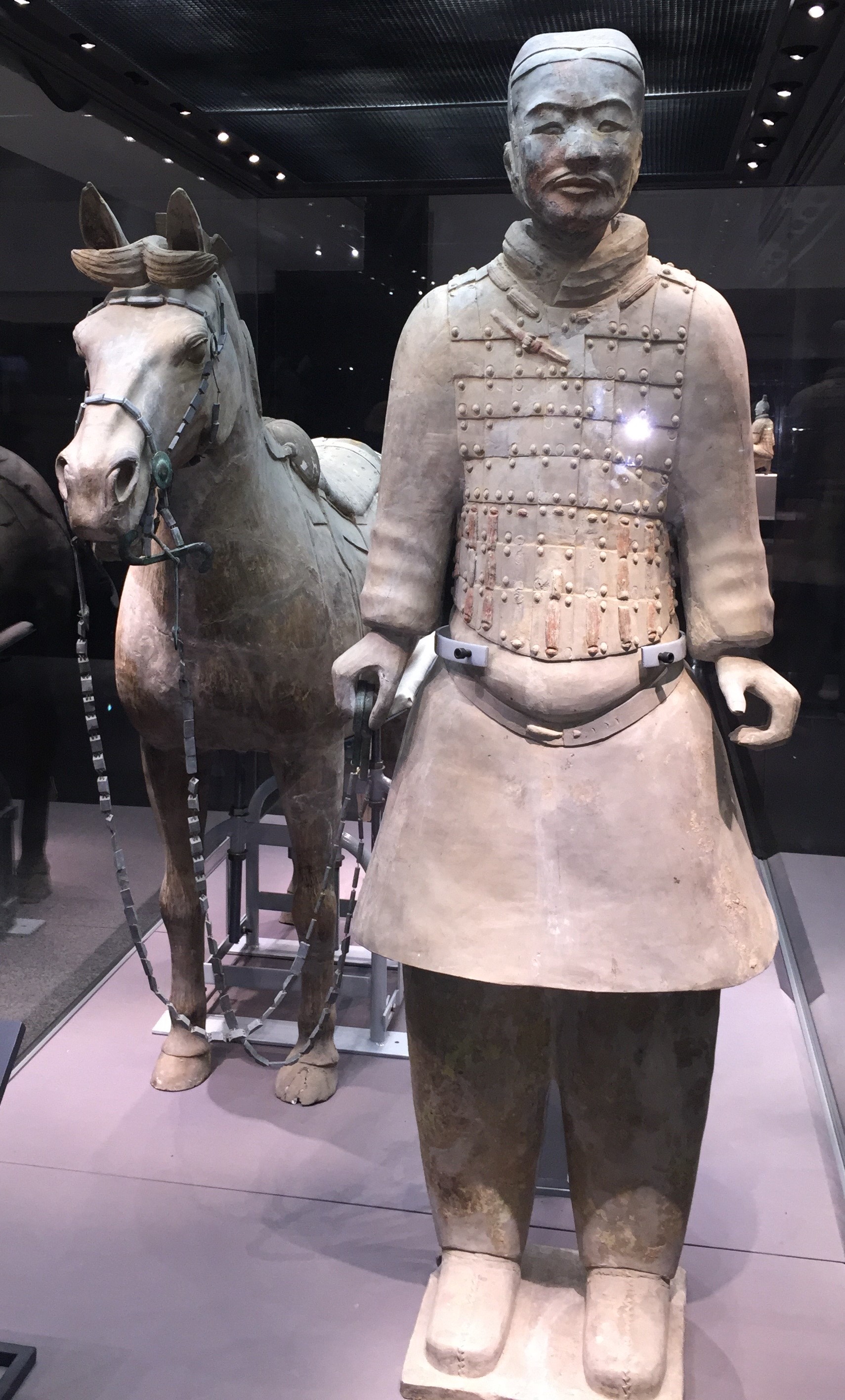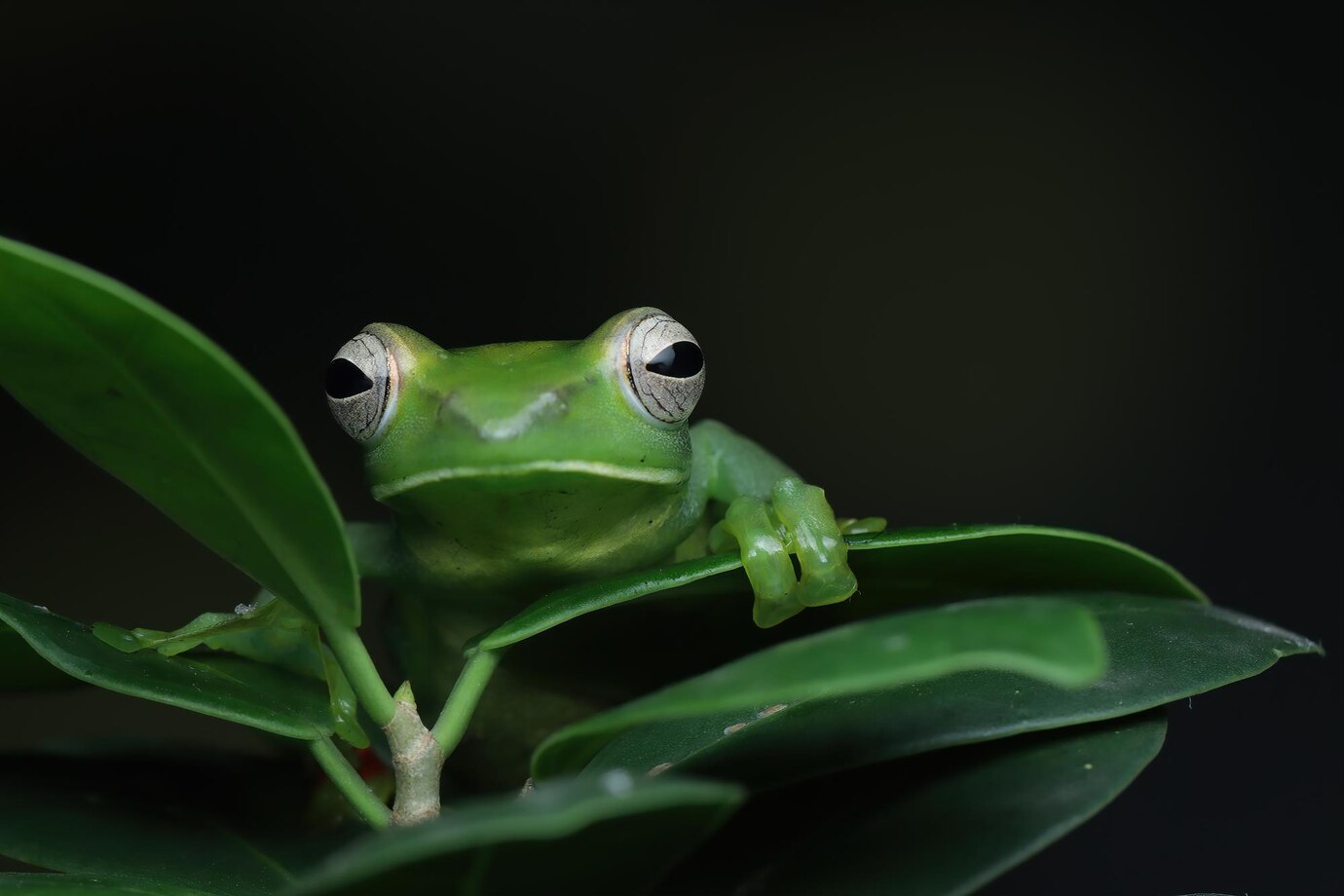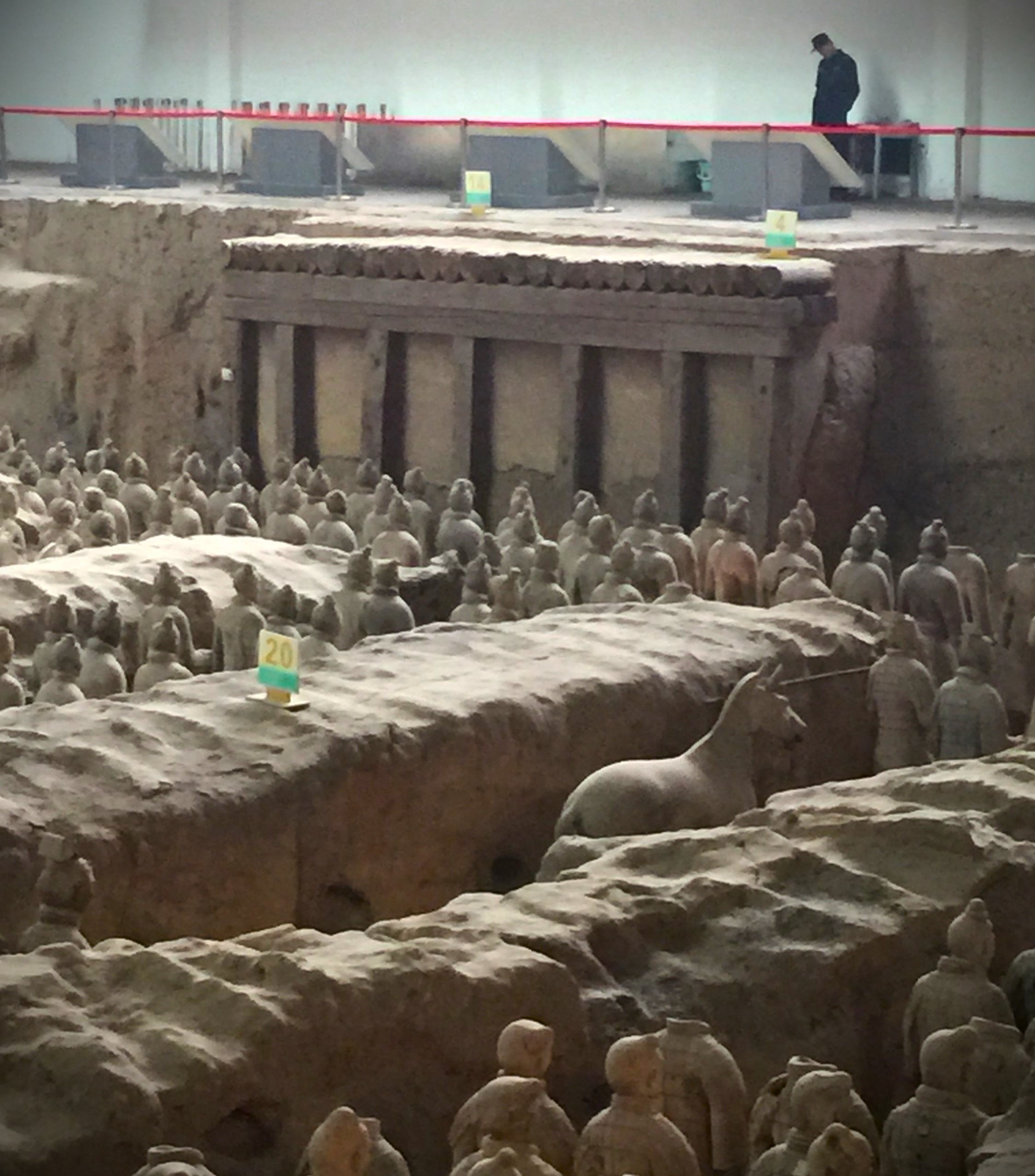

A trip to Newport can mean many things, especially shopping and hitting the best bars and restaurants on the East Coast. I urge you also to take a moment and consider the lighthouses in the area. Each has a story to tell. One favorite of mine is Rose Island Lighthouse near Newport Bridge. I've taken my kids there and have many fond memories. So much so, in fact, that I had to set a pivotal chapter of Goody Celeste at Rose Island Lighthouse. I invite you to take a look here:
Now that you've visited Rose Island Lighthouse, I hope you'll check out more of Rhode Island's magic in the pages of Goody Celeste.
https://www.amazon.com/Goody-Celeste-Chris-Riker/dp/1665307072
- Details


"Do we really want to blow up a hospital?” someone asked as the kids of MT-829 shuffled back, drained and swaying on their feet in the November swelter. It was an old question. A hospital, a pizza parlor, a nail salon, a piano factory? Yes, they all had to go. This was the gig the Cadre had assigned to them, and no one wanted to disappoint the Cadre.
Laura checked the settings for the third time, her fingers playing across the screen as if plucking out Schumann’s Concerto in A on her grandmother’s Steinway. She knew how to operate the control pad, even if its inner workings remained a mystery. Six weeks of training covered field operations and enough safety protocols to keep from accidentally melting the kids, but not much more. She drew heavily on her experience as a teacher of piano and of English.
She pointed out the quirks on the pad screen to Wart, who was listening to music on his headset. She nudged him hard, and he took it off.
“Pay attention,” she admonished as if he were her… what? Child? No, she dismissed that thought, telling herself instead that these kids were on loan. No permanent attachments. “The trit-pros have to be within forty meters. Any farther out and we’ll have to turn them up to full blast – which’ll create an infernal mess.” She felt more confident with this command thing; not too different than herding students through Bradbury or Orwell. “Check the targeting scanner again, Wart.”
He did as he was told, moving about in the fidgety way of teens. “Why do you call me Wart? My name is Bobby!”
She shot him a smile. Laura would not be using that name. He asked again whether he could key in the final signal; Laura reminded him for the thousandth time that on big reductions like this one they chose by lottery. Wart pursed his lips; five weeks and he’d not gotten a turn on a really big one. Laura was grateful for that.
Crassus Health Care Systems Hospital was a monster: a tower sprouting wings, hive-like parking decks, and outbuildings in all directions. It covered four city blocks and required their full complement of trituration projectors (trit-pros), carefully arrayed in a perimeter. A ghastly pale teenager, Juanita, a frequent lottery winner, walked up in loose-fitting boots; her thin lips bore a hint of pleasure at being chosen.
Laura made one final check to see that all members of Mitigation Team 829 were wearing their protective head gear. Without its noise cancellation software – which Wart had altered to pump his head full of music – she’d have a squad full of fence posts. They were good. Twenty souls focused on her through the masks. Laura pulled on her own gear then nodded at Juanita to do the honors.
One feeble finger, skin barely holding in its skeleton, tapped on the screen. Laura’s guts burbled inside of her. She fretted over whether she had moved the team back far enough, out of range of the collimated waves. Yes, of course, or else they’d be dead.
The structures targeted for removal absorbed the powerful sympathetic vibrations. Fish scale windows sounded a C8 note as they sprayed out into dusty nonexistence. Trapped automobiles screamed, then curled into a fetal position and died in a puff of metallic flakes. Concrete, stone, and brick and mortar began to shimmy in the afternoon light. The liquefaction was modern performance art on a grand stage. The towering central monolith hung for a moment, then surrendered to gravity, its subordinate buildings following its lead, as everything in sight defused into granular uncreation. The air filled with the sound of unmaking and the land below their feet grumbled. Crassus Hospital returned to its constituent material, a powdery cascade settling into the earthy gash where its foundations had been.
They put in long days; she tried her best to slip in some teaching. “Now,” she said pulling off her helmet and headset as the heavy dust cleared, “a quick lesson.” Very quick. “Let’s practice our imagery. A candy bar for good similes or metaphors.”
“Mrs. Witten!” Mattie screamed for attention. “The tower crashed to the ground like a murdered giant!” Apt albeit violent. Laura rummaged in her kit bag for a brightly wrapped snack filched from an abandoned store on Sockanosset Cross Road. She tossed the sugary ingot to the girl.
“The stone giant fainted like a diva in the final act.” Ibriz had skill. She vowed to push the solemn-faced boy harder in his studies. Almond Snickers for Ibriz.
Wart grinned his Wart grin and spoke: “Having watched his fellow Olympians pass from this life, Hermes surrendered his temple to oblivion.” Oh, Wart. She knew she shouldn’t have favorites, but Wart was special. She was not going to let herself tear up. She would not do it. She pulled out a bag of Warheads Extreme, super sour junk Wart loved, and handed it to him.
Much as she’d like to expand on their lesson, they couldn’t stop working. They had to keep moving. At this rate, they’d be stuck in Cranston, Rhode Island through the holidays – not a happy prospect. If she hit her quotas – there was zero chance of exceeding them – she might work up the courage to ask the Cadre for more school supplies, maybe a portable classroom to take from city to city. No more picking a new meeting place every day.
Mitigation Teams went where they were told. There were worse jobs than being a sapper. The Venom Wranglers moved in first, capping gas lines and containing nuclear, chemical, and biological facilities. The Wranglers had a high mortality rate; terminals usually took that job. Squadrons of drones handled the onerous task of animal control. And then there were the Ferrymen, who went door to door searching for the fallen. She didn’t like to think about that gig. Every city they went to had its lime fields and crematory pits. The stink of the Ferrymen’s work hung in the air.
“I always dreamed of seeing Beijing or Kuala Lumpur or Paris. Why can’t we blow up the Louvre instead of the ass end of Providence?” Wart whined.
“You’re too young to be cynical.” Laura checked her control pad to ensure it was recording the tonnage and general composition of the pile they’d just created. There was a fortune there in the anthropogenic dust. For someone. “You’ll see those places,” she told Wart. Maybe, she told herself. With luck. “They’re not on the list. We only erase the abandoned ones, like Cranston.” Third biggest city in the smallest of the former United States. The population plunge made for hard choices.
Everything was going to plan. Laura keyed in the call for the fist-sized dredgers to swarm in their billions, rivers of iridescent scarabs flowing to and from their latest jobs around the vanishing city. Self-replicating, tireless, the bots did yeoman’s service. They’d dig through the heaps and separate the useless carbon from the fine metals, recyclables, and rare earths. They’d stockpile anything of value for the future. The busy bugs also transported toxic waste cross country to waiting stellavators, titanic mag-lev needles that shot the most mephitic bits into space.
The big picture was overwhelming in scale, but simple in theory: clean and restore; keep a bad situation from getting worse. Maybe nature would forgive foolish humanity and pull its final punches. Maybe not.
Loading up into the vehicles, she noticed some of the kids, Barry, Johnnetta, and Lika, trading items they’d found: a coin, a sparkly diamond cross necklace, a pair of dentures.
“Don’t load yourself down with souvenirs,” she chastised them in a voice more drill sergeant than schoolmarm. “Learn to see what really matters.”
Orphans, all of them. As the world emptied out, billion by billion, governments withered and snapped apart. Unfettered by laws, a nebulous Cadre of wealth and power arose to fill the gap. It found these lost boys and girls and signed them up for work. It gave them supplies, good tech, bad boots, and medical care. In exchange, the Cadre was literally banking on a future boom time of cheap real estate and raw materials. Free labor creating valuable stockpiles of resources. Assuming anyone survived, of course. Best not to question the methods or motives of these men.
The team moved on to some quickies: restaurants along Park Avenue as well as the road itself. “Nevermind window shopping. It’s all junk now! Keep moving!” Wart barked at the others. Wart, all fifteen years of him, was her Border Collie, cajoling or bullying the other kids to keep them in line. In remission, he had all the energy of any other teenaged boy. Her job was to keep Wart focused so he could oversee the others. It should not take more than ninety minutes to render a dozen shops this size into useful mounds of stuff.
Ah, stuff. The stuff that dreams were made of. Careers, families, riches, more riches. Stuff. When her sappers were done, those dreams were erased and the stuff was returned more or less to its original form, sorted, stacked, ready for use. One day, this re-booted land would attract new dreamers. She thought about that day: it could happen.
As they were setting up, DaShawn ‘Doc’ Kegler pulled her aside. The title was honorary, though he had military medical training. The salt-and-pepper hair, handsome face, and active build were all his. Doc was a welcome sight, one of her fellow grown-ups as well as another unwilling member of the ‘Lucky 13,’ the percentile who showed no signs of any of the new illnesses.
“Three today,” Doc said succinctly. Tests on three of her kids had come back positive for something bad. There were scores of exotic illnesses spawned by a hotter, wetter world. These children had lost families to disease, starvation, or war. They survived only to face this.
“All new?” she asked. Laura looked into Doc’s eyes. There was trouble there.
“No. Two are new cases. I think we need to send them back to base. The other one is…” She knew before he even said it.
The prospect of death was nothing new for any of them. Each had lost friends and loved ones. The bond to the sweet unnoticed ‘normal’ had snapped. She hated this festering wound. She’d happily lay down her own life if it would satisfy the sniggering gods, but no higher power jumped at the offer. Not a whisper.
As the light faded, she drove her kids to the elegant and soon-to-be demolished Edgewood Manor B&B on Norwood Avenue. Two adult chaperones kept the adolescents from getting frisky. Laura didn’t like these old places – too many ghosts. She preferred her yurt, set up outside next to a waist-high wall of stones stacked in the New England fashion.
By the time she made it back there for the night, Laura felt as if someone had used a trit-pro to pulverize her skull. She pulled off her grit-covered work clothes, washed in a basin, then reached into her personal bag and found her purple diary. As she stroked the small book, her eyes fixed on the silver Sacred Heart ring on her finger. She got it when she was a teenager, back when she knew everything with certainty. Her beliefs had changed through her life, she was forever trying new ways of seeking. She kept the little ring, moving it to the third finger of her left hand two years ago, after she buried an engraved pair of gold bands in her garden while Robert’s dog Lexington looked on.
“No. Stop. Live in the present,” she said to the air. Silver Sacred Heart ring. Unlike the city around them, it was worth more than its melt value. She’d once thought of passing it on to her children before turning away from the idea of having them. She might give it to one of her young charges when they got old enough. “If they got old enough.” She tried selling herself a hearty, ‘new medical breakthroughs happen every day.’ Of necessity, she deflected her feelings for the many faces that joined the team only to fade and vanish.
Too much thinking.
Laura arranged her crystals around the diary: one amethyst, two rose quartz, and a tiger eye, and lit a small candle. Fumes from the guttering flame freshened the musky skins and fabric of the yurt with the scent of jasmine. She turned to her digital piano keyboard and set the playback for one of her own performances, Liszt’s ethereal Sonata in B Minor, then began her Reiki exercises. Pressing her palms together in front of her heart, she bowed. “My intent is to…” She couldn’t find the thought. To do what? Survive another day? Be happy? No, those were negatives in disguise. She tried again. “I will be one with my world.” Good enough.
Clearing her mind, she began her movements while regulating her breath. It was important that she keep herself fit. Still a lot to do. Her work-weary muscles protested as she eased into the familiar motions to brush away the spiders, unblock her chakras, and let the energy flow.
Finally, it was time to write this day into her diary. Her spirit fox had something to say. Some called the fox a trickster, and she’d certainly fallen into many of his emotional traps over the years. Robert had helped her to recognize that the fox was also a teacher, a role she’d held in the real world and now in this in-between life. The fox counseled adaptability.
That meant optimism, something the dredgers would never find in a billion piles. Finding a bright future these days required a stubborn, foxlike determination to make it happen. She looked over what her hands had left on the page. Hmm. Seems like the peacock contributed some thoughts. She was most used to the fox taking lead as her spirit guide, but there were others, including the gaudy bird who bestowed intuition and awareness. In this case, the peacock told her that some opportunities were available. Her owl days, rare as they were, gifted her with silent wisdom. The opportunities she hoped for carried the risk of loss. Fox, peacock, owl. In her mind this totem bestiary warred with itself. If the ship that was her life had a figurehead, a bow spirit, it would have many furry and feathered faces.
And the ship would sail in circles, she told herself. Enough thinking. She closed the diary and went to sleep.
Cranston was stubbornly clinging to the world the next morning. They kept discovering new, old pockets of civilization within its borders. Laura allowed herself a distraction, a stroll through the little white library on Wilbur Avenue. In its long history, the one-story clapboard building, fronted around the girth of a sheltering oak, had been a schoolhouse then a library. Leaving its reading stock in place, the library’s staff had taken pains to ensure it was orderly and clean inside. Walls gleamed as if they’d just been painted. Why? Among the children’s literature, she found the book she was looking for, an old copy with a bedraggled cover and notes scribbled in the margins, meaning it had been well-loved. Someone had turned down the corners of several pages. She read to herself about quests and love and great destinies.
As if on cue, Wart appeared at her shoulder. “We can zap this place later today if you like. We’re set to go with the boats.” He said it meekly rather than blurting it out as he usually did.
“Thank you, Wart.” They looked at each other like partners in a comedy act. “You talked to Doc?”
“Yes. I’m going to Boston base camp,” the boy said, as if pronouncing his own execution order.
Her mouth hung slack and stupid for several beats. “The recovery rate is getting better all the time,” Laura tried, putting a hand on his shoulder. He pulled away sharply.
“Don’t deuce me! I just got the whole speech from Doc. Why you gotta deuce on me too?”
“I’m not – whatever you said. I’m not lying. You have to have hope. Focus on the work. You are helping to build a bright future.”
“No.” He threw his hands wide to indicate the library and the city beyond. “We’re not building a future… we’re covering up past mistakes. The human race blew it. It’s done!” Wart added a final pronouncement with a ferocity that blasted through Laura’s Supergirl defenses. He said, “I’m done!”
It was too much. How dare he give up on the world, on himself! Not Wart. Anger flared like a thousand terrible suns. Her hand was suddenly above Wart’s head. She swung down with all her strength. He did not move. Surely he had enough time to react. Her reflexes weren’t as fast as a boy’s, she told herself. Wart was waiting for the blow, wanting it.
Her hand dipped low just in time, missing his face and pounding his shoulder instead. “Fine!” she yelled at top volume. Dragging Wart out of the library, she said, “You win the lottery today.”
Her words burning in her own ears, she shoved him into a vehicle. An awkward ride later, they joined the team at the water’s edge. The rising tides of Narragansett Bay had claimed much of the Edgewood Yacht Club. King Quahog held court. The clubhouse was submerged up to its roof. A two-master wedged itself, bow to the sky, into the second floor dining room. Other sailboats showed evidence of storm and neglect; a few were mere masts and rigging sticking up through the surface. Little Sunfish clung stubbornly to lines lashed to sunken pilings.
Laura made one last head count and double-checked that the team members were all wearing their protective gear. She punched Wart in the arm. Hard. He thumbed the pad’s flashing red circle…
…and the devil sang jazz.
Gulls squawked off in terror like angels escaping from hell. The flooded clubhouse took the full brunt of this man-made hurricane, collapsing into splinters and spume. Crunching fiberglass hulls leapt from the water like dolphins as the projectors boiled the swells into steam. Had they still been alive, the captains would have burst into tears at this spectacle. The kids began jumping around and hugging each other in joy. Their loudest applause erupted as Wart, with Laura’s permission, boosted the signal to full. A Coast Guard cutter lay at anchor just outside the marina, while a streamlined superyacht kept station in the bay. Both did St. Vitus’ dance as the trit-pros gripped them without mercy. The ships gyrated like all other targets; now at full blast, the trit-pros made them do more. The two vessels flamed up like oily rags touched by a lit match. It was wasteful to produce this much fire and smoke – but, what a show!
The creators of the trit-pro system had done their job well. The projectors contained the squall to the target area while the destruction within it was absolute. Everything died down within a few minutes, leaving a messy sluice of flotsam and islands of grit.
“That felt good.” Wart was smiling and crying. He looked at her in a certain way because she was doing the same. A lot was coming out of both of them. They felt good. And awful. The reality was that Wart was sick and headed to an uncertain round of treatments. She hugged him closely while the other kids watched, dropping any pretense of drill sergeant stoicism.
The heat wave finally broke in mid-December. There was no chance of snow, but at least they weren’t dripping with sweat all day long. They left I-95 and I-295 in place for future through traffic, but spent their days turning local roadways into a dull grey powder. There were no Wal-Marts, pawn shops, or Del’s Lemonade stands left to drive to anyway. The place was beginning to look like the first page in a new story.
Wart returned from Boston after a month of treatments. He looked too small for his coveralls, tired, moving like an old man. For a day or two, he and Laura exchanged niceties, nothing more. She was scared. There was no telling whether this treatment would be any more successful than the last. Her owl counseled caution, distance.
“Damned owl!” When you are most in need, give. She had learned that lesson on her own, without the help of her metaphysical menagerie. Much to her surprise, she valued empathy even though it got in the way of delicious self-pity.
Laura called MT-829 together on Christmas Eve. They had met their mission goal with time to spare – time she had plans for. The Cadre had filled her requisition as hoped and the grown-ups had set everything in place that afternoon. “We’re ready for The Works,” she announced to cheers from kids and adults alike.
The dredgers had finished, leaving neat piles of dross and exposed fertile soil across the expanse that had once been Cranston, Rhode Island. The stage was set.
There was no lottery tonight. Every kid was a winner – and for once, she felt that was a good thing. In truth, she did not know if she believed in miracles the way she had when she was a little girl. When it came to these kids, though, she decided that anything was possible.
People crowded around Laura’s little piano keyboard. With massive speakers scrounged from somewhere, it did a mean impression of a pipe organ. She played while Doc led the team in singing Handel’s Messiah. Doc had many talents.
As the final ‘hallelujah’ echoed into the crisp night, Laura brought up her pad, set to glowing a festive green and red. “Honor system. Raise your hands. Once you’ve had a turn, lower your hand until everyone’s gotten a chance. There should be plenty for everybody.” She looked at the rows of rocket launchers. Christmas? More like the Fourth of July.
It was time to get started. Laura almost called out Juanita’s name aloud. She was gone. Gone like so many of Laura’s kids. Keep it positive, the peacock told her, this was a happy night. She took the hand of a shy girl whose hair was falling out in clumps and told her to fire the first shell.
Off whizzed the rocket, blazing a comet trail across the sky until it passed above the cremains of Crassus Hospital. KTACKT! SSST! WHOMFF! Like an oversized Roman candle, the round exploded, illuminating the moonless vault and pelting the ground with high velocity projectiles.
The next kid stepped forward. It was Wart. As his friends whooped and yipped, he pushed the button and his rocket flew off on a new trajectory. Over and over, waves of joy swept the team as young hands fired new salvos in all directions. This was no mere amusement. The payloads were seeds, packed in protective shells. The blast fired life-bearing bullets deep into the soil. Come the rains, the nutrient-laced shells would dissolve and the seeds would awaken.
Humans had messed up. They had taken all they could and left the world wobbling uncertainly on its axis. Now, it was time for people to fix things by using the finest technology on Earth, developed over billions of years: trees. Primal tech to scrub the air. Splendid oak and elm, hemlock, sugar maple, bountiful apple trees, cottonwood, plus breathy cedar and their conifer cousins. Trillions of them, eventually, all over the planet. Trees would reclaim cities that once banished them.
This became the team’s mantra: it could happen.
Laura, who was not so old after all, stood before the young faces. She said, “I want you to think about tomorrow and the coming year. One day, all this work will be done. What then? You. All of you are our real mission. Starting Monday, we’ll have school every morning for three hours, using one of the vehicles as our mobile classroom.” This last bit had been the fox’s idea. The head gear could expand the school day. With Wart’s help, she would input music into the noise cancellation software: Peter and the Wolf for scouting missions, bombastic Wagner for demolitions. She caught herself and thought, Maybe not Wagner. I’ll work on the playlist.
She’d sell the idea to the Cadre… somehow.
No.
She would do it quietly, without asking permission. Even if the Cadre objected, it was easier to apologize. It was time now to set aside valueless fears, take what mattered, and build something new. Something better.
She reached into her kit bag and pulled out a copy of the book she’d taken from the library. “We’ll begin by reading this book by T.H. White.” Laura looked at her star pupil, who smiled back. “It’s about a boy named Wart who dreams of honor and justice and a future in a shining city on a hill.”
###
If you enjoyed this story, please share it with friends. Feel free to check out more stories and novels, here on ChrisRikerAuthor.com
- Details
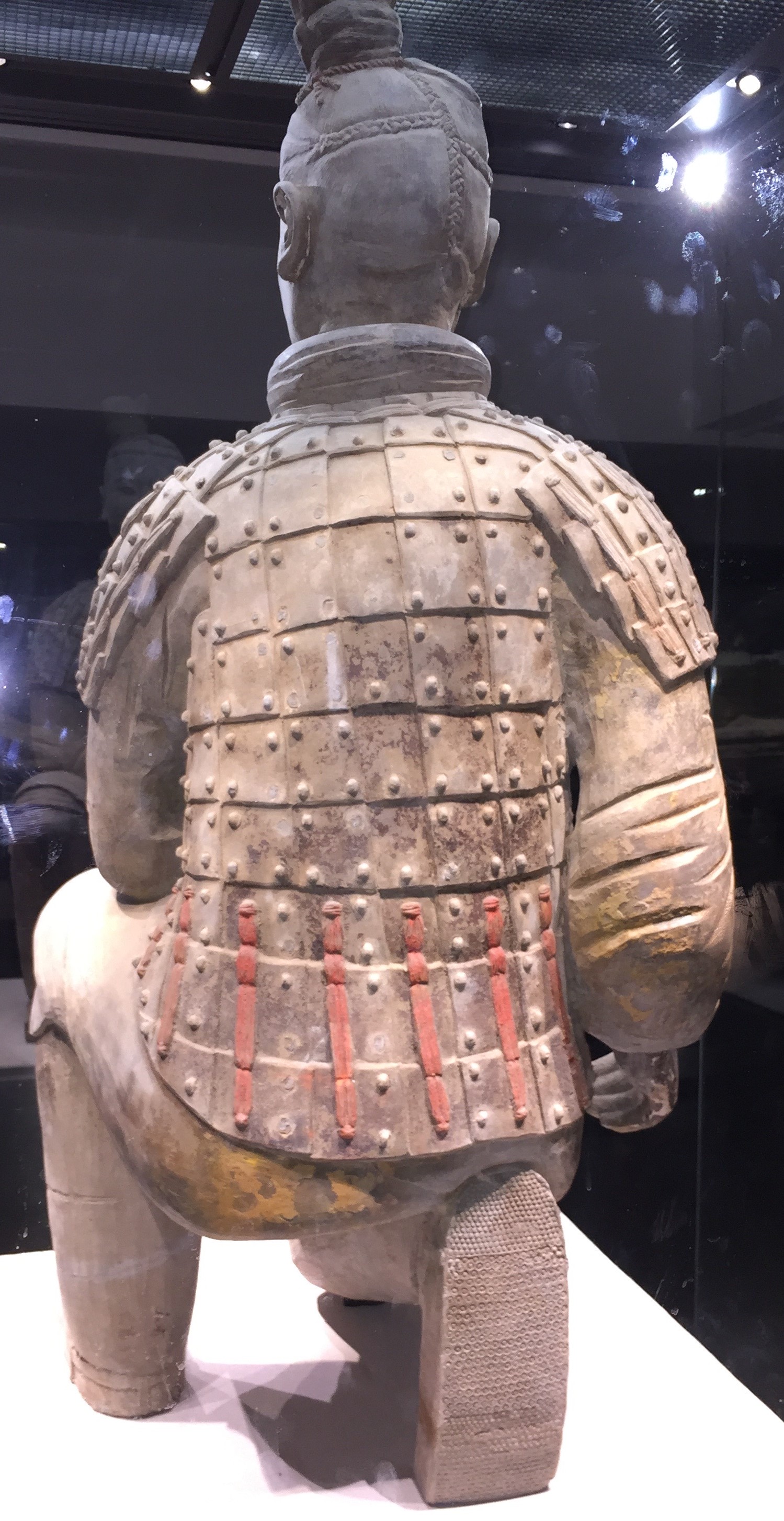
Think you have a tough job? This guy's been on his feet for 2,200 years. How does he do it?
Readers of Zebulon Angel and the Shadow Army know I love the Terracotta Warriors. They're just cool. Scientists are still discovering amazing things in the site where Qin ordered his shadow army hidden. It's been more than two millennia, but Chinese footwear appears to have something to teach us...
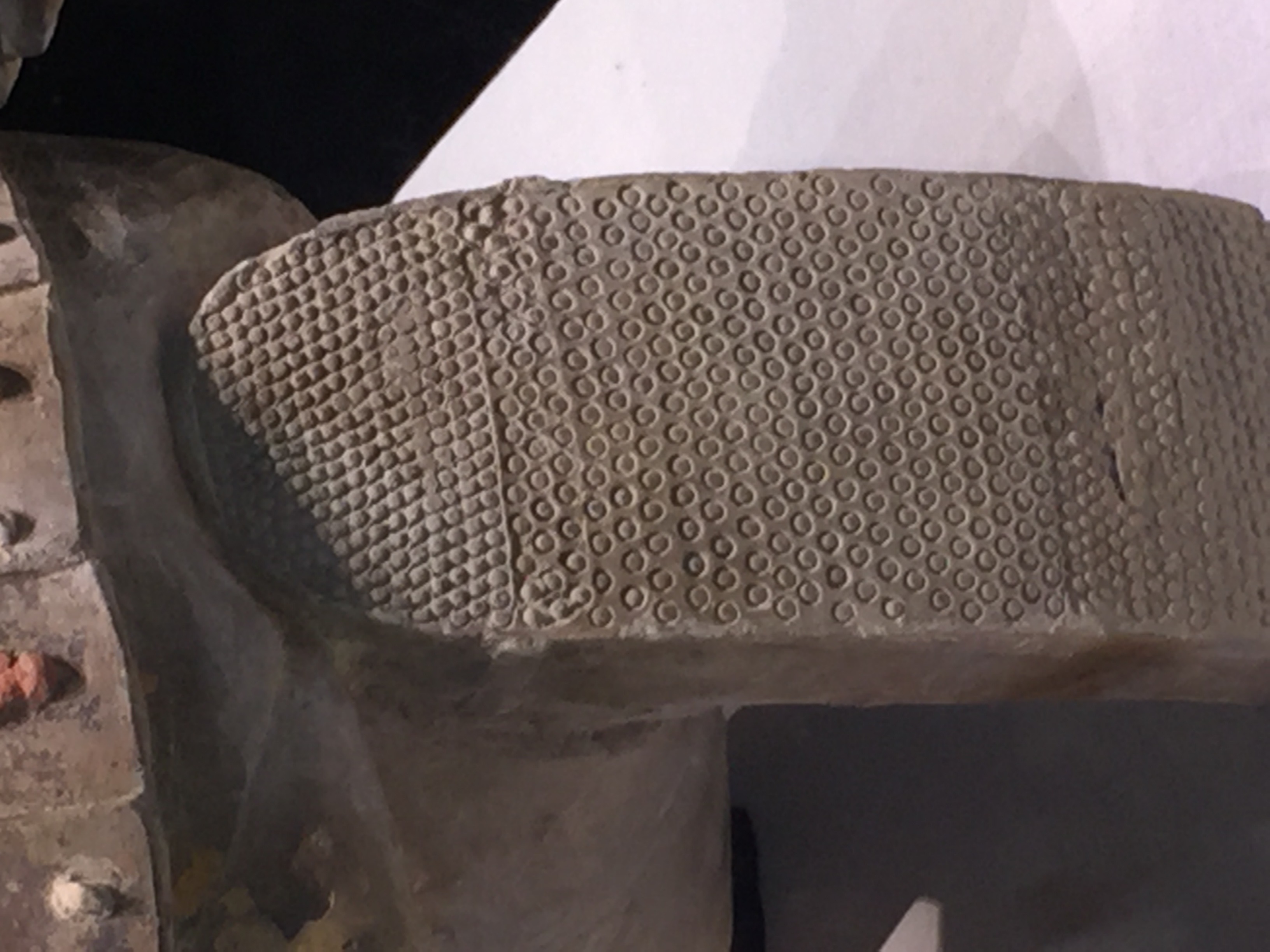
You can see how our hero, Zebulon, came to visit Emperor Qin in his Night City... in...
https://www.amazon.com/Zebulon-Angell-Shadow-Chris-Riker/dp/1637107056
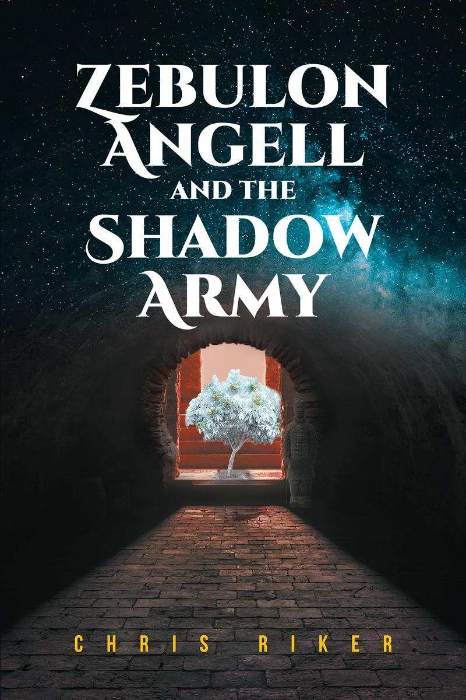
https://www.amazon.com/Zebulon-Angell-Shadow-Chris-Riker/dp/1637107056/
- Details


At random times, I do a search to see what's new with dolphins. Just a check on new research or events. They never disappoint! Here's a little something that reminds me why dolphins (and octopodes) are the stars of Come the Eventide.
https://www.earth.com/news/bottlenose-dolphins-have-a-newly-discovered-super-sense/
Bonus:
https://www.wwf.org.uk/learn/fascinating-facts/dolphins
Octobonus:
https://lithub.com/shes-bouncing-the-ball-on-the-uncanny-way-octopuses-play/
PLEASE do not eat octopus and stay away from profit-making businesses that use dolphins against their will (which is always). Thank you.
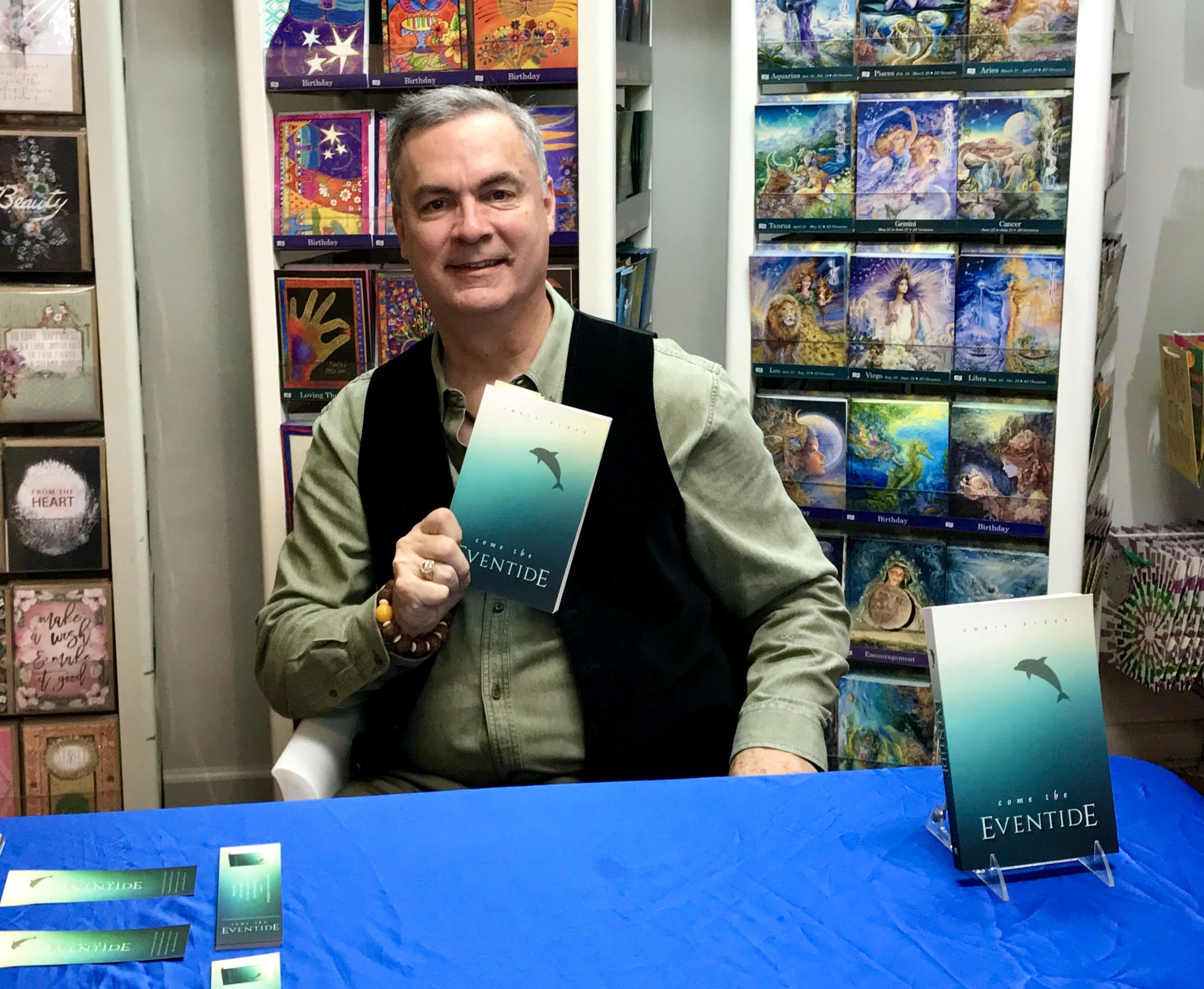
Hey -- who the hell decided this is FREE? Oh well, enjoy!
https://www.amazon.com/Come-the-Eventide/dp/B084GRHPKQ/
- Details
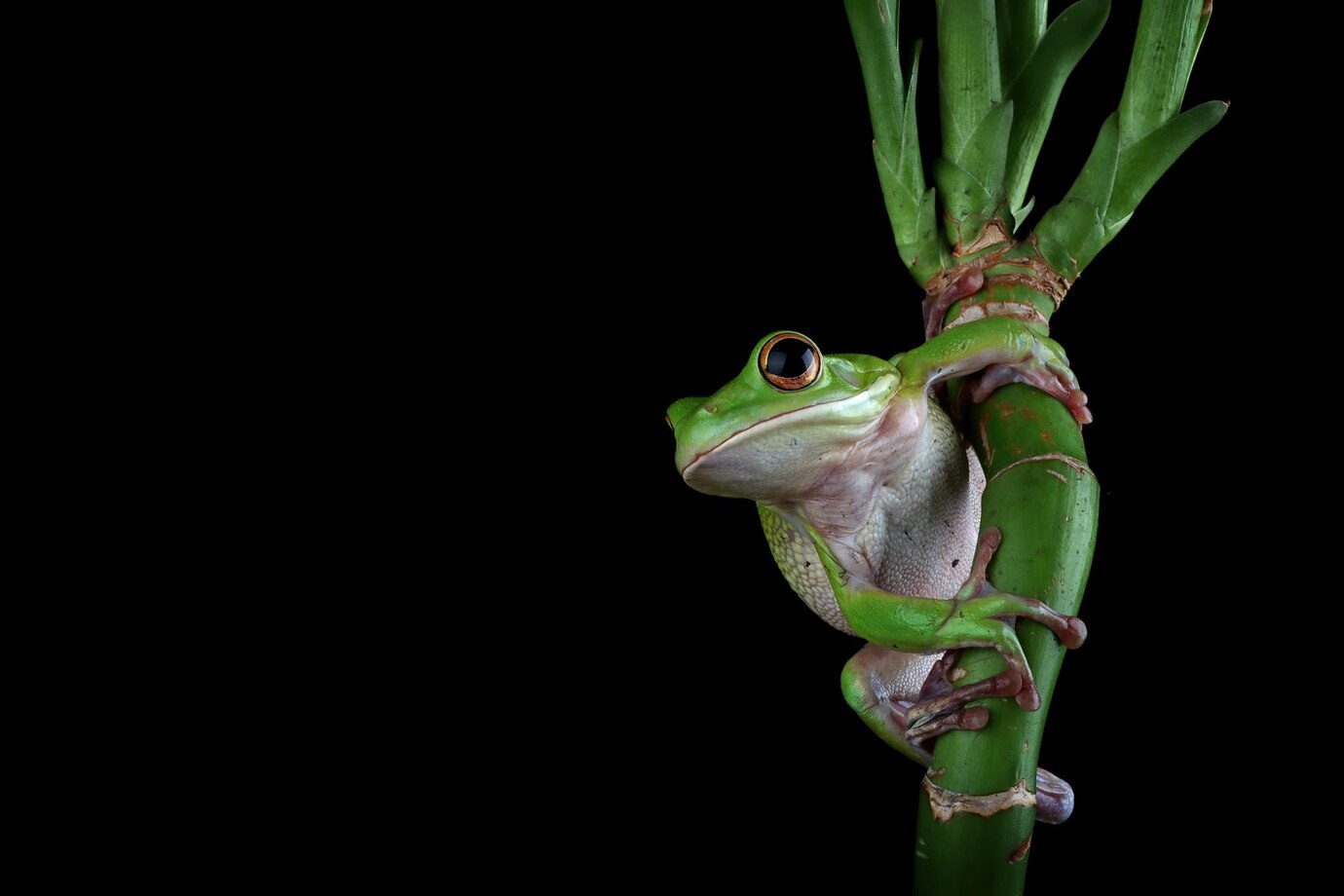
It all began about a year before the Great Upheaval, as people came to call it.
One morning at six-forty-one, fearsome hornets burst from her phone; it was the seven o’clock conference call come early and ugly. Even as she absorbed invectives, Wyche thumbed through her messages, a chorus of high priority notes screaming: ‘lost margin threatens to deflect from the PRIME BLUE LINE!!!’ Bold caps, italics, and exclamation points. Not good.
Tony was up, dressed in fresh clothes he kept at her place, and ready to go. No dawn quickie this morning. He called a ride for both of them, appearances about arriving at the office together be damned. How had he gotten word so early? Why hadn’t he warned her? She tried to ask between gulps of coffee, then they were off.
At eight-oh-six, The Colonel bellowed the nine o’clock meeting to order and sleep-starved corpses snapped to attention. Heidi’s team had screwed up.
“Dr. Eggar offers no reason for this cluster hump,” The Colonel hissed until their midtown Manhattan office reeked of venom. Heidi was The Colonel’s kapo. What could have happened? “One of you nut scratchers must have picked up on something!” Sphincters puckered. “But do I get fair warning? Oh, nooo!” Bladders strained. “I have to do every mother-loving thing myself!” Testicles retracted.
As the fusillade thundered on, Wyche quietly thanked her stars that this boss brushed his teeth, unlike his predecessor, El Jefe, who favored garlic bagels and tequila for breakfast. She could smell it on him whenever he leaned in close or rubbed against her. He rubbed a lot of the women the wrong way. El Jefe got the ax, not for grabbing ass in the workplace, but for using company funds to pay for his hijinks, including a Bahamian retreat with the IT gal. HR sent the master swordsman packing after a little bird in Accounting ratted him out.
The Colonel was different, more focused, literally a commanding presence in his starched shirt with epaulets – she could almost see the eagles. Wyche sensed him deeply, envied his gravitas. What must it be like to be the drill instructor, to get people to jump?
The Colonel had been there for two months and the clock was ticking. He explained, “The good doctor’s texts are filled with garbled nonsense about grub-eating aborigines who live ‘in compassionate harmony’ on a few hundred acres of pristine rainforest. Don’t get me wrong, Eggar’s a top-notch fixer, none better, but she was supposed to relocate those grinning gibbons and get the clear stripping started again. There have been few progress reports. All she’s sent back is this!” The Colonel produced a white box.
The Colonel opened the top and pulled out a plant, its helically braided trunks supporting a lush miniature canopy in an artisanal pot. He dumped it onto the $48K teak-with-silver-inlay conference table, sending crumbs of soil and bugs everywhere. Clearly, no one at Customs had inspected the contents of the package. The lovingly trimmed plant was a succulent that sported a very singular shade of green, green like the eyes of a lover from some lost affair, green like the helmets of the New York Jets early in the season before they surrendered all hope two months later. Attached was a cryptic note: ‘For the boss.’ The Colonel turned the plant one way then another, brushing the thick glossy leaves as if in admiration. Wyche half feared he was merely pretending to like the small lifeform and would suddenly rip it out by the roots and fling it at the wall.
“Maybe it cures cancer,” Wyche meekly suggested and immediately felt small inside her finely tailored attire. The Colonel’s expression could not have grieved her more had his eyes shot blood like a horned lizard. Why was it so hard to make points with this one? Tony kicked her under the table to remind her the conference room was no place to have ideas.
“Do you see that plaque?” The Colonel pointed to the wall, where the company seal hung emblazoned with a white narcissus and a motto. “Vis medicatrix naturae! The healing power of nature. It’s the bedrock of this corporation. Magical cure-alls. People love magic. It was true in Ponce-de-Leon’s day and it’s true now. More importantly, people will pay dearly for it. There’s only one problem: there is no magic. Oh, maybe this little plant would make a good salad, but cure cancer? Not likely. And studying it would cost a fortune in years and dollars.
“No, boys and girls. We will not chase after miracles; we will make our own. Cures for baldness, big bellies, and limp dicks, all thanks to our premium line of aqua vita. We don’t need to go looking for it. We’ve got the company’s Florida facility at Lake Macaco, pumping all the water we want, courtesy of the municipal treatment system. Of course, we can’t just sell it as is. The FDA won’t let us promise actual miracles. So, we need a massive facility in the Amazon. Landing strip, storage, support. We ship the water there, wait seventy-two hours, slap a new label on the bottles, declare it Amazonian, and use medical dispensation statutes masterfully written by lobbyists for passage by our friends on Capitol Hill. Then, we ship it to our customers.
“At least that’s how it would work if Heidi’s team had secured the land for the support center. It should have been a two-week trip with a suitcase full of cash in hand. Simple. But, no. She dropped us tits deep in monkey swill. So, now it’s on you people. Drop whatever you’re doing; this is priority alpha! Work your contacts. Grease some wheels. Re-invent the wheel. Just get it done! Get those godforsaken aborigines, trees, and lizards out of there and build me my damned fulfilment center. Get it done or I swear I’ll send you all to the turd mines!” That last was code for the telemarketing department, and he meant it.
The clock was indeed ticking. The company had other teams watching two back-up sites; they were eager to steal The Colonel’s project. That was unthinkable. His team members hit their computers and phones, doing everything in their power to keep the office on track.
Over drinks at the James Hotel that evening, handsome, confident Tony explained his partial solution. He’d made certain the designated purchase funds ran through his accounts, meaning he had to sign off on any land deals. He’d be the first to know when any other team tried to move and he could stop them dead.
“You want to get a room here? It’d be quicker than going back to your place.” In their early days together, Wyche used to get whiplash from Tony’s way of jumping from cut-throat business deals directly to sex, but she’d grown used to it. He was often on the phone while he was on her. His technique was… different, primal. She almost liked it, except for his emotional walls. For instance, they always went back to her place; in three months, she’d never seen his apartment and wondered whether he had someone else. It didn’t really matter. Tony might not be the marrying type, but he had his uses. She’d made vital contacts through him. She agreed to the tryst, but suggested they have another drink first then steered the conversation back to shop talk.
“Even if you stop the other teams,” Wyche said, “do you think The Colonel can pull the trigger on this thing? The local governments are on the side of indigenous peoples’ rights. Without that paperwork, there’s no sale.”
“It’s a train wreck,” Tony said with a grin. “The Colonel is totally rattled. He didn’t come out of his office all day. I saw Tyisha go in and come out stone-faced, like he dumped her or something.”
“Or something.” Wyche muttered. Tyisha and The Colonel were an item, his choice of office mate. In the lady’s room, she’d needled the details out of Tyisha: The Colonel hadn’t dumped her. He’d proposed marriage.
Through the next several days, The Colonel kept himself to himself. Wyche peeked in the door to find him preening Heidi’s green gift. He was talking to it.
Thursday, the morning call never came. Wyche dressed and ate breakfast before going in. The nine o’clock meeting began promptly at nine. “There’s no need to have everyone up with the roosters. We’ll conduct our business at this meeting.” The Colonel was positively chipper. He was smiling. As he solicited updates, he volunteered a flurry of ‘good work’ and ‘excellent idea’ compliments.
Wyche leaned in to check his eyes. Clear blue and laser sharp. He wasn’t snorting his breakfast like the one three bosses ago did. She noticed something else. He occasionally stole a furtive glance at his right hand. There, between his big Army ring and the knuckle, was a fleck of green no bigger than an aphid or a freckle or a speck of guacamole. It was none of those. The thing had four splay-toed feet and two infinitely black eyes.
That morning, the memos began popping up on people’s devices and screens. One called for civility in the workplace. ‘No Cussing Fridays.’ Seriously? This guy was cracking down on potty mouthery? He also proposed team building through socializing outside of work. Specifically, he wanted co-workers to adopt one of the city’s micro-parks and clean it up.
No one knew quite what to make of it. Gossip consisted of things not said. Folks around the office passed each other, one would open their mouth, the other would widen their eyes, and the conversation would end before it began.
Wyche finally went in to talk with him. The Colonel beamed a friendly welcome. After dancing around the issue for a moment, she said, “This new approach you’re taking with us, is it something you learned in the Army, Colonel?”
He tittered like a schoolboy. “I was a colonel – in Junior ROTC. I was in the Army for four years, made it to first lieutenant. People respond to titles, so I make use of it. Funny, I’ve never felt less like a soldier than I do now. No tension, no pressure. I think Heidi’s gift is a great stress-reliever.”
Wyche looked again at the plant on The Colonel’s desk. “You haven’t been smoking it, have you?” It was a risk; this man had no trace of humor. At least, he never used to.
The Colonel laughed gently and then became introspective as if he were narrating his own dream. “It’s all about balance. The universe knows when we forget our place and start to strut about like tiny gods. It felt me drifting apart, becoming all full of myself, and it took action… like a cat jumping in the lap of the grumpiest man in the room.” He picked up a mister and gave the ficus a few quick sprays. “It’s not mystical. Well, maybe a little. I tend to this life,” he said, gesturing at the plant with the mister, “and it gives back what I need.” He reached around to a shelf and brought over two paper cups, each containing a baby ficus spawn with a jellied clutch of eggs clinging to it. “Life is connections.” He handed the cups to Wyche who smiled perfunctorily and took them back to her desk.
She went away befuddled. The Colonel was… nice? Had he always been this way, down deep? Did the frog have anything to do with this change of heart? She inspected the tiny plants and found, to no great surprise, they were teeming with tenants. The healing power of nature indeed. Heidi. The Colonel. Funny, Wyche figured she must have been exposed to these little fellows as much as anyone, but she didn’t feel any different.
Employees began acting like people, smiling for no reason, trading jokes. There was a betrothal in Billings. It couldn’t go on. Things at the office got too pleasant for HR to ignore.
The next thing people knew, The Colonel was waving good-bye. He seemed not to have any hard feelings about his firing, and while that might have had to do with his golden parachute, Wyche suspected it was something else. His last remark was something about going to join Heidi in the Amazon.
On Monday, the newest boss, Medric Bourne, breezed in on a vapor of styling gel. He spent the day introducing/branding himself as a financial wizard and picking out a twenty-three-year-old woman from Accounts Receivable to be his executive assistant. Bourne welcomed the contractors who showed up, moved The Colonel’s old desk, his plant still on it, to one side of the office, and began smashing through the opposite wall. Bourne insisted on a bigger office. That, of course, destroyed Tony’s office.
“He didn’t say a word,” Tony said to Wyche over the noisy demolition invading his former domain. “Come on, we’re done with these losers. We’re quitting.”
He stomped off while she stood with her mouth open like a stuffed carp. “Right, we’re leaving,” Wyche said to the coffee machine. She thought a thought, pushed it away, then thought it again and let it make itself at home inside her. Grinning, she went to her desk to collect a couple of things.
Wyche got word a few months later: the new guy was gone. Bourne and the Amazon project crashed when he used corporate funds on a massive rainforest conservation campaign that included a profit-sharing plan for the aborigines.
Meantime, Wyche and Tony co-founded Lightship, LLC, a successful import-export operation headquartered atop an attractive spire along Central Park West, in the concrete heart of New York City. The pressures of the job occasionally threatened to harden her heart; in those moments, she turned to her newfound love of horticulture. Though her relationship with Tony cooled after she gently rebuffed his marriage proposal, he supported her keen business decisions and their fortunes rose. Within months, they were doing phenomenal business. Wyche designed the company’s logo, a happy amphibian living in a tiny tree. Each time Lightship approached a new company she sent the boss a company card and a potted gift in a very singular shade of green.
If you enjoyed my little tribute to Nathaniel Hawthorne, please SHARE with your friends. Thanks!
- Details
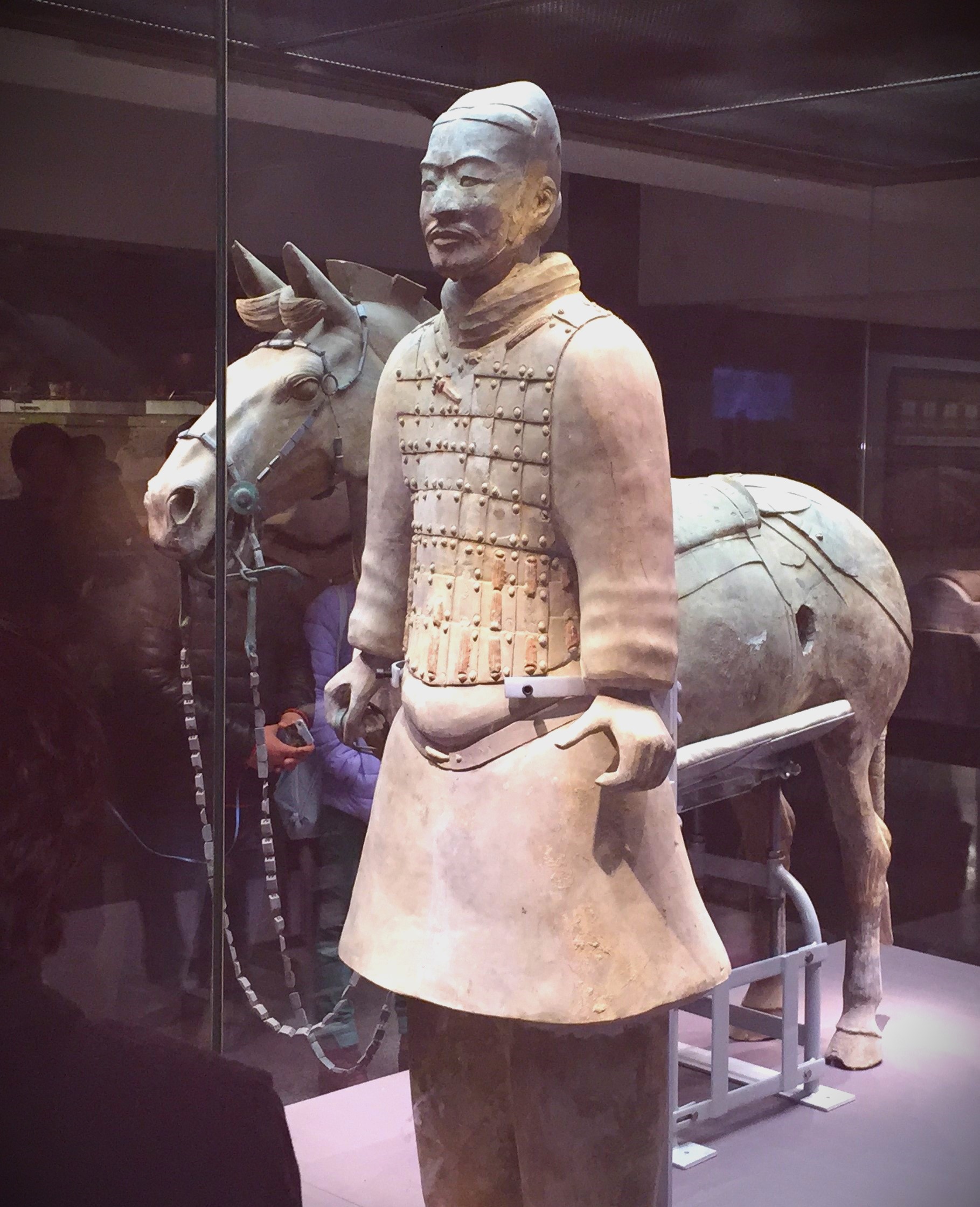
An emperor's toy soldiers... full-sized and armed! My family and I paid a visit to the Terracotta Warriors in Xi'an, a display unmatched anywhere in the world.
Learn how an army buried two over millennia ago came to light... an army that helped inspire Zebulon Angell and the Shadow Army.
https://www.bbc.com/news/world-asia-china-44244493
So... you might be wondering what it would be like if those soldiers came to life... inside Emperor Qin's tomb... while you were trapped with them. Take a look:
https://www.amazon.com/Zebulon-Angell-Shadow-Chris-Riker/dp/1637107056/
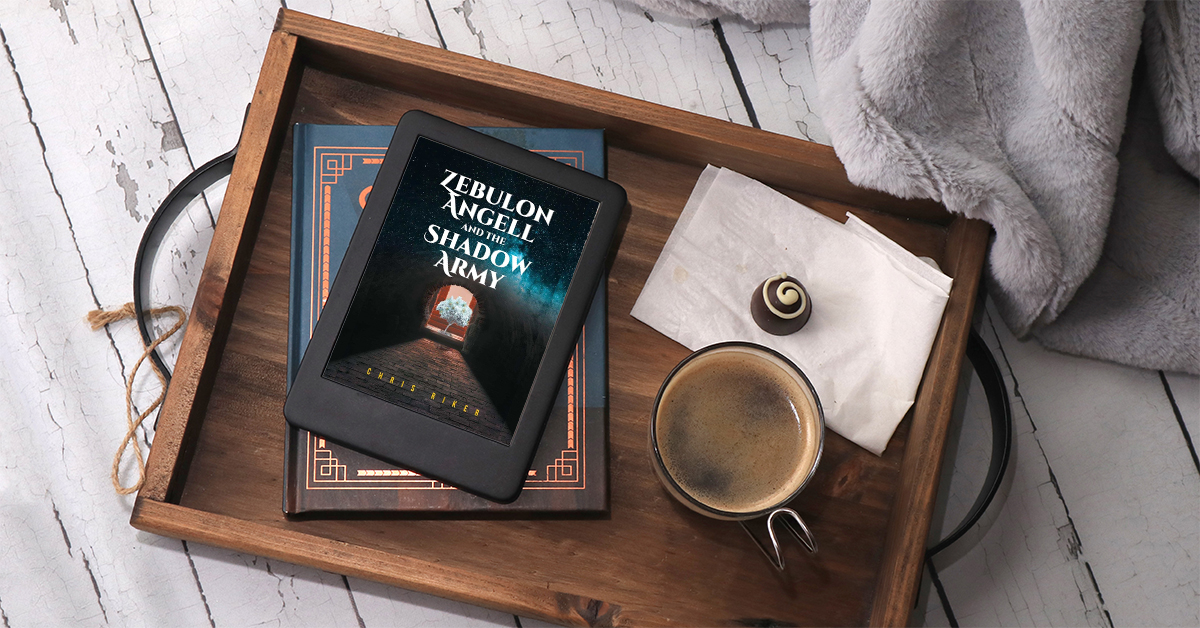
- Details
